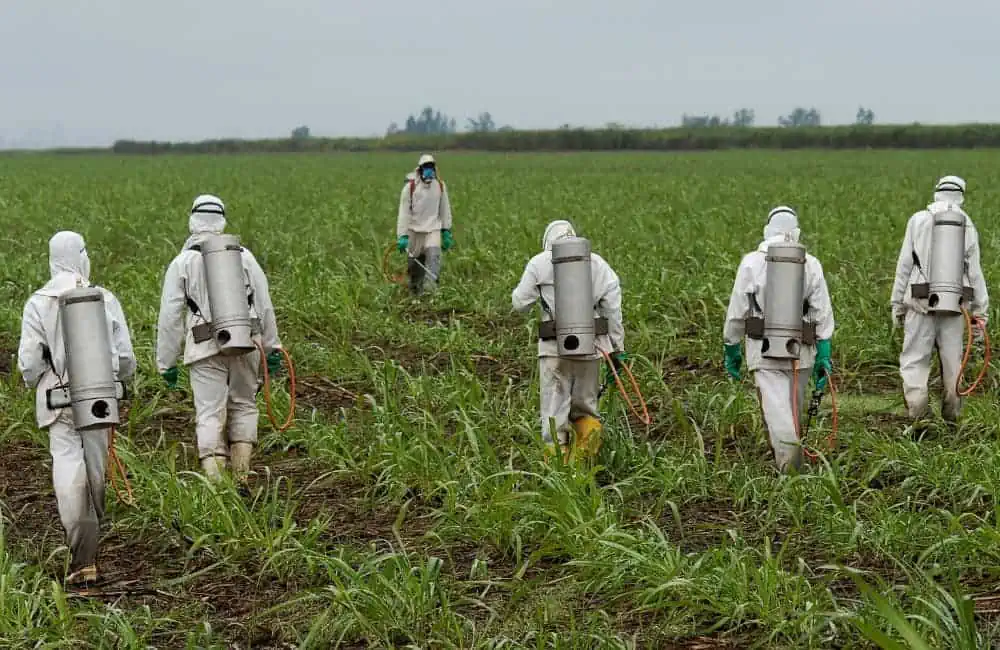What Is Paraquat Exposure?
- Last Updated: August 4th, 2023

Attorney Jessica Paluch-Hoerman, founder of TruLaw, has over 28 years of experience as a personal injury and mass tort attorney, and previously worked as an international tax attorney at Deloitte. Jessie collaborates with attorneys nationwide — enabling her to share reliable, up-to-date legal information with our readers.
Legally Reviewed
This article has been written and reviewed for legal accuracy and clarity by the team of writers and legal experts at TruLaw and is as accurate as possible. This content should not be taken as legal advice from an attorney. If you would like to learn more about our owner and experienced injury lawyer, Jessie Paluch, you can do so here.
Fact-Checked
TruLaw does everything possible to make sure the information in this article is up to date and accurate. If you need specific legal advice about your case, contact us by using the chat on the bottom of this page. This article should not be taken as advice from an attorney.
What Is Paraquat Exposure?
Paraquat is a toxic herbicide that has been widely used by farmers and agricultural workers since the 1960s.
However, due to paraquat’s hazardous nature and numerous cases of paraquat poisoning from 2000 to 2016, the Environmental Protection Agency (EPA) began employing risk mitigation efforts.
These measures are intended to prevent fatal poisonings and illnesses caused by paraquat exposure, including Parkinson’s disease.

Today, only farmers and agricultural workers who are commercially licensed to use paraquat are allowed to purchase the herbicide.
These individuals must go through the EPA’s certification process and receive training before they can legally apply paraquat.
Non-licensed individuals are prohibited from purchasing paraquat, even if they are supervised by a licensed applicator.
Table of Contents
What Is Paraquat Used For?
Paraquat is technically paraquat dichloride.
Along with Roundup, it is one of the most popular commercial herbicides in the United States.
Products such as Gramoxone, Helmquat, Parazone, and Firestorm are all brand names of the of the generic chemical product.
Farmers and agricultural workers typically use the chemical for killing weeds and protecting crops and can easily be exposed to the chemical if they are not wearing the proper protective gear.
Some other common uses of paraquat include eliminating potato stems, drying out cotton crops, controlling grasses and weeds in orchards, and reducing soil erosion.
However, products containing paraquat can have an adverse effect on human health.
For that reason, paraquat is now sold with a blue dye to prevent licensed applicators from mistaking it for a drinkable substance.
Some people have mistaken paraquat for coffee or other beverages in the past and inadvertently poisoned themselves, particularly when paraquat is transferred into beverage containers (which is now illegal).
Paraquat on the market in the U.S. today also contains a strong odor to deter any user who tries to ingest it, as well as an agent that causes vomiting should someone accidentally ingest the herbicide.
Paraquat is so toxic that even a tiny sip of the chemical can be fatal.
How Paraquat Exposure Occurs
Because paraquat is a restricted use herbicide under EPA regulations, only licensed applicators are allowed to use and apply it.
Most individuals who are exposed to this dangerous herbicide are farmers, agricultural workers, and people who reside near farms and cropland.
Paraquat is most fatal when it is ingested, which can occur if paraquat has been transferred to another container and the applicator mistakes it for a beverage.
However, simply inhaling paraquat or having it touch the skin can result in serious illnesses.
Exposure can occur when an applicator mixes, loads, or applies the herbicide.
It can also happen when an applicator cleans out any container or tank designed to hold paraquat.
People who reside in agricultural areas can be exposed to the herbicide through various means, including contaminated water and wind drift.
Non-licensed individuals who reside with licensed applicators, such as the spouses of certified agricultural workers, can be exposed to paraquat if they come into contact with protective clothing worn by applicators on the job.
They can also potentially be exposed if they visit the applicator at their worksite.
Health Consequences of Paraquat Exposure

Exposure to paraquat has been linked to a number of serious health conditions.
Research has shown a direct link between exposure to paraquat and an increased risk of developing Parkinson’s disease, for instance.
Paraquat exposure can also cause problems with the liver, kidneys, heart, brain, lungs, and other vital organs.
Ingesting paraquat may cause symptoms such as tissue death, blood clots, kidney and liver failure, lung collapse, decreased blood pressure, dehydration, oral ulcers, cell death, and lung cysts.
If paraquat is ingested, the first signs will typically show up in the digestive system.
They include stomach pain and cramps, bloody stools, vomiting, oral bleeding and swelling, pain in the mouth and throat, and other symptoms.
These symptoms may lead to other serious side effects, including difficulty breathing, seizures, weakness, yellow skin, and even coma.
Long-term exposure to paraquat can also cause serious illnesses like Parkinson’s disease.
Parkinson’s disease is a progressive neurological disorder that usually begins with palsy (tremors) and progresses to slowed movements and muscle stiffness over time.
According to the Parkinson’s Foundation, more than 300 active lawsuits have been filed against the manufacturers of paraquat (the biggest manufacturers in the U.S. are Chevron and Syngenta), alleging that the manufacturers failed to disclose the link between Parkinson’s disease and the use of paraquat.
Because there are so many lawsuits, and more are likely to be filed, the courts combined the cases into multi-district litigation to help expedite the paraquat lawsuits.
If you have had adverse health consequences as a result of exposure to toxic pesticides, including any of the brands listed above, you may be entitled to compensation for pain and suffering, medical expenses, and lost wages.
TruLaw and their attorneys are investigating paraquat lawsuits today.
Use our instant Case Evaluation tool to learn if you are eligible to file a lawsuit against the manufacturer of paraquat today.

Managing Attorney & Owner
With over 25 years of legal experience, Jessica Paluch-Hoerman is an Illinois lawyer, a CPA, and a mother of three. She spent the first decade of her career working as an international tax attorney at Deloitte.
In 2009, Jessie co-founded her own law firm with her husband – which has scaled to over 30 employees since its conception.
In 2016, Jessie founded TruLaw, which allows her to collaborate with attorneys and legal experts across the United States on a daily basis. This hypervaluable network of experts is what enables her to share the most reliable, accurate, and up-to-date legal information with our readers!
Here, at TruLaw, we’re committed to helping victims get the justice they deserve.
Alongside our partner law firms, we have successfully collected over $3 Billion in verdicts and settlements on behalf of injured individuals.
Would you like our help?
At TruLaw, we fiercely combat corporations that endanger individuals’ well-being. If you’ve suffered injuries and believe these well-funded entities should be held accountable, we’re here for you.
With TruLaw, you gain access to successful and seasoned lawyers who maximize your chances of success. Our lawyers invest in you—they do not receive a dime until your lawsuit reaches a successful resolution!
AFFF Lawsuit claims are being filed against manufacturers of aqueous film-forming foam (AFFF), commonly used in firefighting.
Claims allege that companies such as 3M, DuPont, and Tyco Fire Products failed to adequately warn users about the potential dangers of AFFF exposure — including increased risks of various cancers and diseases.
Depo Provera Lawsuit claims are being filed by individuals who allege they developed meningioma (a type of brain tumor) after receiving Depo-Provera birth control injections.
A 2024 study found that women using Depo-Provera for at least 1 year are five times more likely to develop meningioma brain tumors compared to those not using the drug.
Suboxone Tooth Decay Lawsuit claims are being filed against Indivior, the manufacturer of Suboxone, a medication used to treat opioid addiction.
Claims allege that Indivior failed to adequately warn users about the potential dangers of severe tooth decay and dental injuries associated with Suboxone’s sublingual film version.
Social Media Harm Lawsuits are being filed against social media companies for allegedly causing mental health issues in children and teens.
Claims allege that companies like Meta, Google, ByteDance, and Snap designed addictive platforms that led to anxiety, depression, and other mental health issues without adequately warning users or parents.
Transvaginal Mesh Lawsuits are being filed against manufacturers of transvaginal mesh products used to treat pelvic organ prolapse (POP) and stress urinary incontinence (SUI).
Claims allege that companies like Ethicon, C.R. Bard, and Boston Scientific failed to adequately warn about potential dangers — including erosion, pain, and infection.
Bair Hugger Warming Blanket Lawsuits involve claims against 3M — alleging their surgical warming blankets caused severe infections and complications (particularly in hip and knee replacement surgeries).
Plaintiffs claim 3M failed to warn about potential risks — despite knowing about increased risk of deep joint infections since 2011.
Baby Formula NEC Lawsuit claims are being filed against manufacturers of cow’s milk-based baby formula products.
Claims allege that companies like Abbott Laboratories (Similac) and Mead Johnson & Company (Enfamil) failed to warn about the increased risk of necrotizing enterocolitis (NEC) in premature infants.
Here, at TruLaw, we’re committed to helping victims get the justice they deserve.
Alongside our partner law firms, we have successfully collected over $3 Billion in verdicts and settlements on behalf of injured individuals.
Would you like our help?












